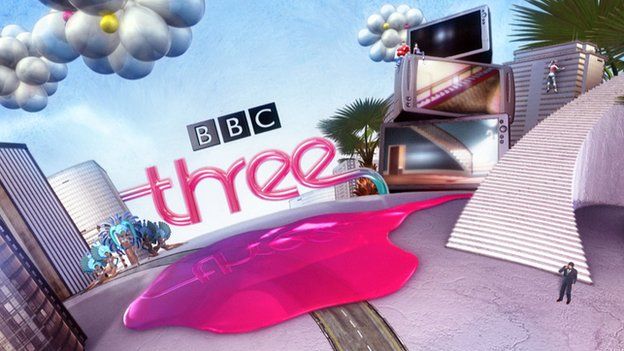BBC Three: From digital first to online only
- Published

BBC Three is renowned for its colourful channel "idents"
The BBC has announced BBC Three, one of the corporation's first digital channels, is to become an exclusively online channel accessible only via its iPlayer service.
Early reports such a fundamental change was imminent prompted a voluble reaction, with celebrities and viewers uniting in their calls for the channel to continue in its current form.
Were the situation to be documented by the channel itself, the resulting programme might well be called Axe, Leave or Butcher? or Russell Howard's Bad News.
In any case, it is unlikely a channel renowned for its brashness, topicality and exuberant, youth-oriented approach will be prepared to go quietly.
BBC Three officially launched in 2003, although it initially began life in 1998 as BBC Choice - the first BBC channel to air exclusively on the digital spectrum.
Andy and Lou were among Little Britain's rotating cast of characters
BBC Choice contained a range of programming aimed at a mixed audience - from repeats of Monty Python to the entertainment magazine Liquid News.
However when it came to be rebranded, it was decided its successor would target young adults.
The BBC said the new channel, BBC Three, would "bring the best in new entertainment, comedy, contemporary drama and music to this young adult audience" and have "a rich, mixed, contemporary schedule".
Yet its birth was anything but smooth, with its initial launch delayed after the then-Culture Secretary Tessa Jowell decided its schedule was not sufficiently distinctive.
BBC Three began broadcasting on 9 February 2003, 11 months later than planned. Its first night's output, part of which was broadcast simultaneously on BBC Two, featured the first episode of Little Britain, satirical animation Monkey Dust and This is Dom Joly.
Initial reaction was mixed. One viewer described its programmes, external as "truly painful to watch", while another dismissed its launch night offerings as "total, unadulterated garbage".
Others were more positive, with one praising the BBC's attempts "to give young talent a platform" and another describing it as "a decent, funny, original and entertaining channel which doesn't require a subscription".
Doctor Who spin-off Torchwood drew sci-fi fans to the channel
Sketch show Little Britain swiftly became one of the channel's biggest successes, making stars of comedy duo Matt Lucas and David Walliams, whose show eventually moved to BBC One.
It was a journey that would be repeated by Gavin and Stacey, whose humorous portrait of a long-distance relationship gave a huge career boost to its creators and stars James Corden and Ruth Jones.
Fantasy drama Being Human, Doctor Who spin-off Torchwood and sitcom Him and Her are among other programmes to have enjoyed both critical acclaim and audience popularity.
Yet other aspects of its output, notably the seemingly downmarket nature of its documentary programming, saw the schedule attacked by those who felt its annual budget - which stood at £85m for 2013/14 - could be better and more wisely spent.
BBC Three in numbers
Weekly audience
13m
viewers
per week
29%
of all 16 to
34-year-olds
-
£85m on programmes
-
6.6p per hour for each viewer
Cost
"Make-under" show Snog Marry Avoid?, My Big Breasts and I and 34 Stone Teen were among offerings that used provocative titles to attract audiences, a tactic which often provoked derision.
One wag even designed his own random documentary title generator, external - a tool which can be used to produce such authentic-sounding mock-docs as Young and Incontinent and My Underpaid Baby.
Snog Marry Avoid? pledged to turn 'OTT girls and boys into natural beauties'
As BBC Three celebrated its 10th birthday last year, its controller Zai Bennett proudly declared it to be "the most watched digital channel in the UK". "We make enlightening, engaging and entertaining shows that can make a difference," he wrote.
"No other channel for young adults makes the volume of documentaries, current affairs and factual that we do or anywhere near the amount of new British comedy."
However in a climate of extensive BBC cost-cutting and competing pressures for funding, the channel has faced mounting calls for its plug to be pulled.
It seems the corporation has finally taken heed of those calls, signalling the end of one era and perhaps the beginning of another.
- Published5 March 2014
- Published22 March 2013